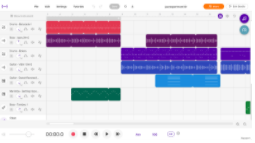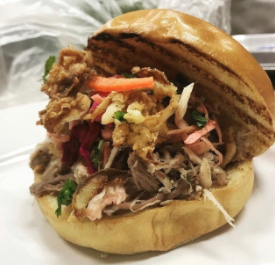The start of remote learning leaves hands-on classes forced to adapt
April 8, 2020
The start of remote learning has left many students making changes to their daily lives. The format of many classes has changed completely, including classes that need a hands-on approach. Various kinds of art, music, and cooking classes had to figure out how to have a class through a computer as opposed to how they are normally taught in person.
Teachers have worked hard to find different ways to engage students in these hands-on classes.
“Our band director [Mr. Pavlik] signed us up for all these composition websites, and we record ourselves practicing,” junior percussionist student Elaine Casey said. “It’s definitely not as good as a real band, but at least it’s something.”

Junior Elaine Casey records her music for Band online.
However, many music students are struggling to adjust to some of the remote learning approaches.
“You have to teach a class somehow, and if you don’t have a concert to work toward, is it any good to have kids practice something that they won’t play?” junior violinist student Clare Cockman said.
Not only are the band students facing these new challenges, but drawing students are also facing difficulties with the new process.
“It’s a little difficult since we don’t have a teacher to help guide us, but with what he’s got to work with he’s trying his best,” junior Advanced Drawing student Alexis Korkowski said.
Just because they can’t meet in person doesn’t mean that some teachers haven’t found ways to help.
“For the [remote learning] drawing class we receive videos of what’s to come and if we have questions or concerns we are able to email or video chat,” Korkowski said.
Teachers have also had to adapt to the new changes by adjusting how they may normally teach.
“All supplies for these classes are normally provided to students so many now don’t have them at home. Also, it’s a large variable to what supplies students may have available to them,” Ceramics teacher Renee Kuharchuk said. “Some students may be able to construct stuff out of old modeling clay or Play-Doh, while others don’t have as much as a marker or scissors, it’s a wide range.”
Due to the range of materials that students can use, students and teachers had to work together to figure out what works best.
“Overall, us teachers and students have had to be very creative in developing new ways to learn our curriculum,” Kuharchuk said. “I also commend my current Ceramics and Advanced Ceramics students, because they have all taken this in stride and have been working hard and developing creative solutions despite this huge change to our norm.”
Kuharchuk decided to focus on more research-based work to accommodate students that don’t have many materials to work with.
“Currently in my ceramics class, students have finished learning about the glazing process. They are also doing research about how ceramics artists use themes,” Kuharchuk said. “Students are having to look at current practicing artists and provide visual examples.”
The food and restaurant management classes are giving their students multiple options to make sure they are able to complete their work with whatever they have.
“We’ve had multiple options throughout, but the [remote learning] I’ve been picking is cooking at home, where I make a dish and then put it into a portfolio and have to talk about it and add pictures,” junior La Brigade student Claire Worobec said.

Junior Claire Worobec finishes her sandwich to practice for her Food and Restaurant Management class.
The new remote learning process has left many students and teachers trying to find an equivalent replacement for normal schooling.
“This whole thing is unprecedented, so I’m not sure what’s best for what class,” Casey said.

